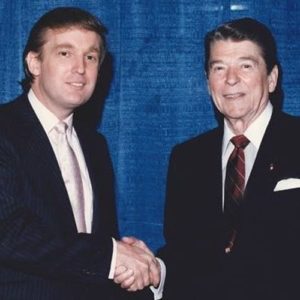For an alternate viewpoint, see “Counterpoint: The GOP Wouldn’t Be Fit to Govern, Even if Trump Were to Leave.”
President Ronald Reagan is remembered as one of America’s greatest presidents as he oversaw the end of the Cold War, creating an exceptional period of peace and an unparalleled economic boom. Simply put, his policies made America safer and Americans more prosperous. Today, he has an almost mythical place in the minds of many Republicans and the political class.
Yet, many who celebrate Reagan’s achievements fail to acknowledge similar accomplishments made under former president Donald Trump and perpetuate the misapprehension that the modern-day Republican Party is somehow vastly different from the 1980s Grand Old Party. As Chris Christie recently stated, “Ronald Reagan would not have recognized the Republican Party.”
He’s wrong. His comment, and others like it, are the byproducts of a bizarre revisionist history with a self-flagellatory bent. The essence of modern Republicanism has not changed, just the tone and tenor of some of the messengers.
Being a Republican today remains deeply rooted in the same bedrock ethos of yesteryear: personal responsibility and government accountability. From there, all else is derived — limited government, free-market economy, secure borders, safe cities and peace through strength.
Detractors decry today’s Republican Party as being corrupted by anti-immigration and pro-authoritarian stances. This fails to recognize that what’s happening at the border is not simply immigration. Most Americans support legal immigration, as did Reagan, but 78 percent of Americans classify the border as either a “crisis” or a “major problem.” Securing the border is a needed step to have a functioning immigration policy and remain a “city on the hill” to which people aspire to come.
Similarly, the world is not all that different from the one Reagan inherited when he defeated Jimmy Carter — the Soviet Union was expeditionary and expansive, Iran was emboldened and took aggressive action against the United States, and we faced a series of domestic economic problems.
Reagan was elected in no small part because of a growing unease and mistrust of government. Americans were frustrated with rampant, big spending on social programs with little fiscal oversight and minimal effect. Bureaucracy was growing unchecked, which led to overregulation that catastrophically affected American workers. There was also blind investment in international agencies that failed to meet American standards and principles. Sound familiar?
Reagan upended his time’s existing state of affairs and was frequently lambasted for it. Many wear retroactive rose-colored glasses, but let us remember Reagan pulled the United States out of UNESCO, cut off U.S. contributions to multiple specific U.N. funds, and encouraged congressional efforts to force U.N. budget reform by withholding U.S. dues. Reagan was criticized by his party as “indulging the get-the-U.S.-out-of-the-U.N. syndrome.”
This is not dissimilar to Trump’s White House suspending funding to the United Nations Relief and Works Agency (UNRWA) for Palestine refugees. Sen. Ted Cruz of Texas recently pushed to hold UNRWA accountable in U.S. courts. Rep. Michael McCaul of Texas is calling for the chief of UNRWA to testify before Congress on their role in the October 7th massacre in Israel.
Reagan, like Trump, distrustful of international agencies, withheld funds from the World Health Organization and criticized its bloat and bureaucracy. Disillusioned with unregulated foreign aid, Reagan argued for “aiding our allies by sharing of our material blessings with those nations which share in our fundamental beliefs” but against “doling out money government to government, creating bureaucracy, if not socialism, all over the world.”
Reagan likewise railed against the “Blame America First” crowd in the United States, which laid the ills of the world at our collective feet no matter the bad actions of others.
There is no shortage of parallels or similarities between the Reagan years and the Trump ones. During his remarks at the annual dinner of the Conservative Political Action Conference, Reagan lauded his achievements, stating: “In five short years, we have seen the kind of political change rarely seen in a generation on nearly every issue: Federal spending, tax cuts, deregulation, the fight against career criminals and for tough judges, military readiness, resistance to Soviet expansionism, and the need for candor about the struggle between freedom and totalitarianism.”
Trump and the current Republican movement achieved nearly all of that in four.
Reagan remarked in his farewell address to the nation, “The fact is, what they called ‘radical’ was really ‘right.’ What they called ‘dangerous’ was just ‘desperately needed.’”
Certainly, Trump does not always exemplify Reagan’s countenance as a “happy warrior.” Some of that may be specific to Trump, but we live in a coarser time. However, when it comes to policy and a government vision, being a Republican means what it has always meant in the modern era. It’s not the GOP that’s lost its way.





